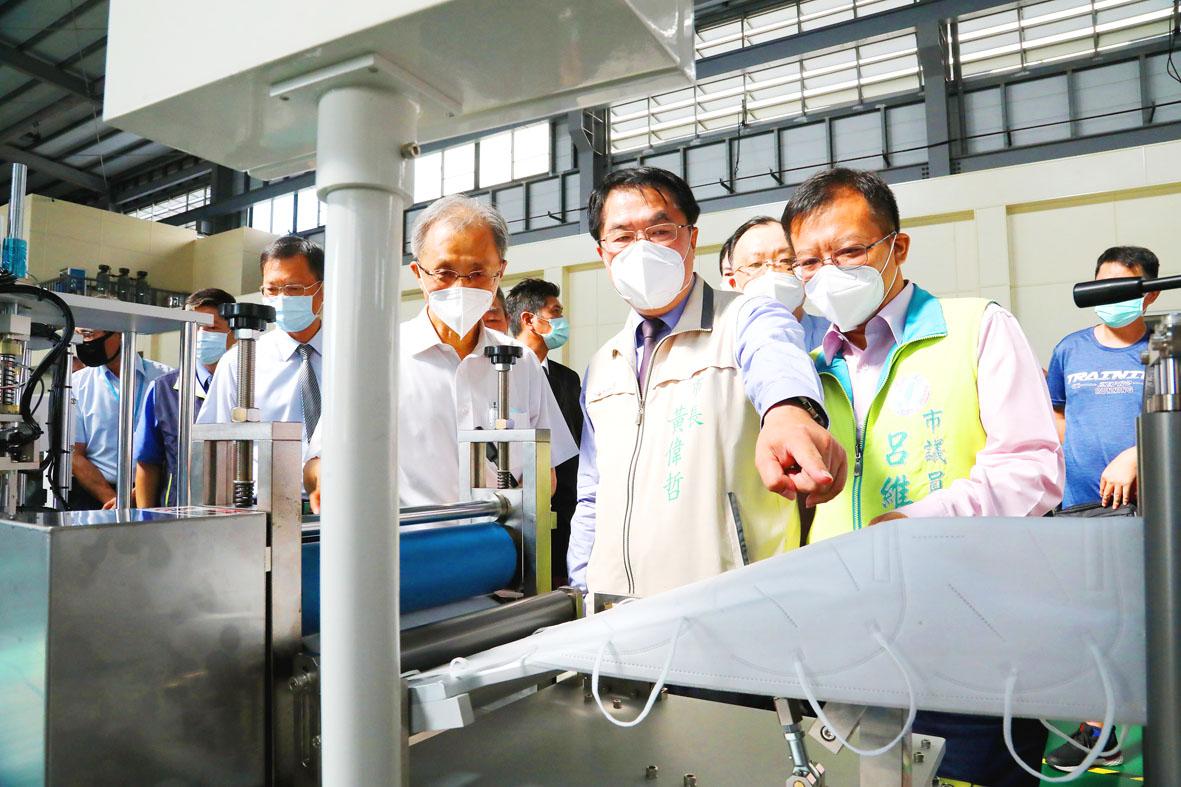The government would withdraw from a firm’s plan to “donate” mask production lines to the Czech Republic if it involves the Taiwanese company making a profit, the Ministry of Foreign Affairs said yesterday, while announcing that the ministry would also donate a mask production line to Prague through government channels.
The Central News Agency (CNA) on Sunday reported that Tainan-based automatic device manufacturer Autoland Technology Co (東建安) was set to realize its promise to Czech Senate President Milos Vystrcil to donate five automated mask production lines to the European nation, a promise it made in September to thank Vystrcil for visiting Taiwan.
Due to political and legal issues, the company was planning to donate four lines to Czech businesses and a fifth to the Czech government, although the government-to-government route might not be workable, CNA said.

Photo courtesy of Tainan City Government
However, the “donation” is being overshadowed by the questions about whether it would involve Autoland making a profit and how the recipients of the lines were picked.
Ministry spokeswoman Joanne Ou (歐江安) at a news briefing in Taipei said that Autoland initially planned to donate five mask production lines to the Czech government, but it has since opted to donate four lines to Czech businesses.
If such a donation was made to the Czech government, the ministry would be glad to see it happen, Ou said, adding that if the donation were made to Czech businesses and involved Autoland making a profit, neither the Taiwanese nor Czech governments would be involved.
“If it is a charitable donation, it should be free of profit-making; if it is a business transaction, the company should follow the regulations in the recipient nation,” she said.
The government plans to donate a mask production line to the Czech government, Ou said, adding that the ministry would provide further information when the details of the donation had been agreed.
The government’s donation is for humanitarian reasons and would be made through its own channels without involving the company, she said.
Autoland general manager Kuo Li-lin (郭立霖) said via telephone that the company’s donation does not involve any commercial profit, but there are some tax issues to be tackled.
The government had promised to help with air freight costs, but now the company would pay for the shipment itself, he said.
Autoland could not make the donation to the Czech government because Czech Prime Minister Andrej Babis said it would not accept donations from Taiwan, he added.
The recipient of the company’s donation would be the European Centralised Virtual Vehicle Register, an enterprise cofounded by Czech materials supplier InoCure and mask producer Good Mask, Kuo said, adding that 5 percent of the masks produced would be donated to the Czech Senate for distribution to state medical facilities.
The Czech-Taiwanese Business Chamber helped to select the recipients, after Autoland required that the recipients be friendly to Taiwan, familiar with mask production and able to visit Taiwan for technical training, he said.

Chinese spouse and influencer Guan Guan’s (關關) residency permit has been revoked for repeatedly posting pro-China videos that threaten national security, the National Immigration Agency confirmed today. Guan Guan has said many controversial statements in her videos posted to Douyin (抖音), including “the red flag will soon be painted all over Taiwan” and “Taiwan is an inseparable part of China,” and expressing hope for expedited reunification. The agency last year received multiple reports alleging that Guan Guan had advocated for armed reunification. After verifying the reports, the agency last month issued a notice requiring her to appear and explain her actions. Guan

The Kaohsiung Tourism Bureau audited six hotels in an effort to prevent price gouging ahead of Korean band BTS’ concert tour in the city scheduled for Nov. 19, 21 and 22 this year. The bureau on Friday said that the audits — conducted in response to allegations of unfair pricing posted on social media — found no wrongdoing. These establishments included the local branches of Chateau de Chine, Hotel Nikko, My Humble House, and Grand Hai Lai, it said, adding that the Consumer Protection Commission would have penalized price gougers had the accusations been substantiated. The bureau said the Tourism Development Act

BACK TO WINTER: A strong continental cold air mass would move south on Tuesday next week, bringing colder temperatures to northern and central Taiwan A tropical depression east of the Philippines could soon be upgraded to be the first tropical storm of this year, the Central Weather Administration (CWA) said yesterday, adding that the next cold air mass is forecast to arrive on Monday next week. CWA forecaster Cheng Jie-ren (鄭傑仁) said the first tropical depression of this year is over waters east of the Philippines, about 1,867km southeast of Oluanpi (鵝鑾鼻), and could strengthen into Tropical Storm Nokaen by early today. The system is moving slowly from northwest to north, and is expected to remain east of the Philippines with little chance of affecting Taiwan,

The military yesterday said it has located the flight data recorder, or black box, of an F-16V jet that disappeared off eastern Taiwan earlier this month, and it would soon deploy a salvage team to try to retrieve it. Air Force Command Headquarters said that while it had pinned down the location of the black box, it was still searching for the aircraft’s sole pilot, air force Captain Hsin Po-yi (辛柏毅). Without providing details, the air force said it had located the black box days after detecting some intermittent signals and would now engage a team of professionals to retrieve it. The air